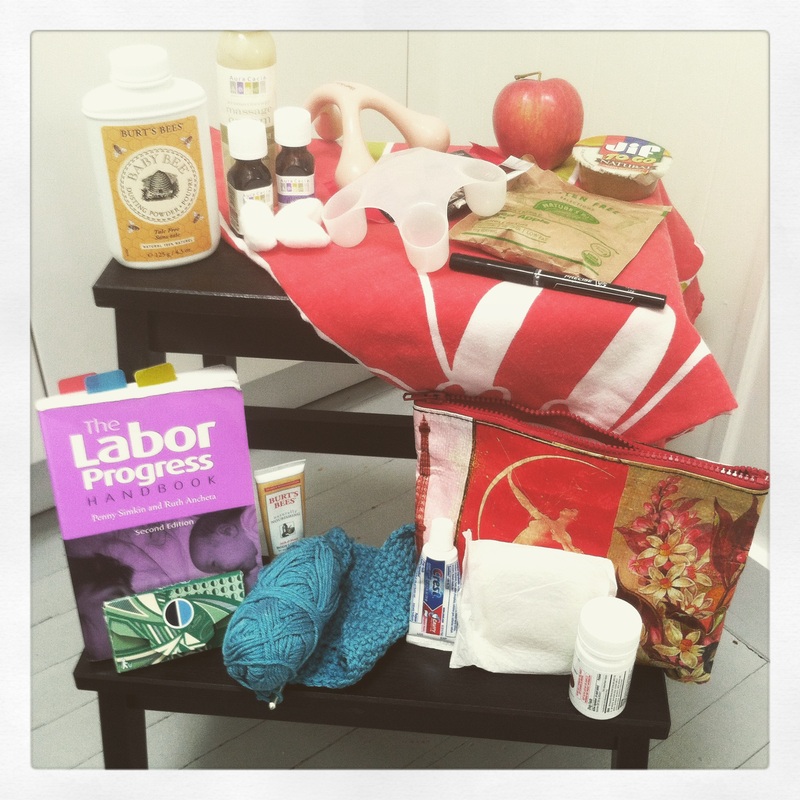I find that I do my job best when I'm in a good place to support the labor and birth; I must be fed, hydrated, (hopefully!) well-rested, and free to focus completely on the laboring mother and her support team (i.e., partner, husband, friend, etc.)
With that said, I bring birth bag to each labor I attend. Here's what is in it:
- oils and massage cream
- lavender and peppermint essential oils (good for relaxation and nausea, respectively)
- powder
- massage tools
- the Labor Progress Handbook
- a "beach blanket" I bought from IKEA years ago (it serves as a rebozo as well as a cover or pillow for when the birth team is resting)
- personal toiletries (pads, tampons, pain reliever, toothbrush and toothpaste, floss, facial wipes)
- snacks (lately I have been more conscious of eating well and bringing more proteins)
- beverages (instant Starbucks coffee, shelf-stable creamer, water bottle)
- my crocheting project or other items to occupy my time when the laboring woman rests or wants privacy
- my client's file (I take notes to assist in writing a birth story to give to the new family)
- my breast pump (I pump throughout a birth, every 3-6 hours depending on the stage of labor and how long I can go between milk removal)
- (not pictured) heating pad or rice sock (heat usually feels good!)
There are plenty of times I never even open my birth bag, with the exception to take out what I need to take notes. And there is a bit of a ritual of emptying, cleaning my massage tools, restocking my food and drinks, washing the blanket, and washing pump parts. It's a way to emotionally prepare for the next birth while processing through a bit of the previous labor and birth (what was used, when in labor did it become useful, etc.).
For me, preparing for someone's labor and birth means not only making sure I have my birth doula bag ready to go, but that I'm also in a good head space to support the birth process. If I've had a rough morning getting my kids out the door to school and then I receive a call saying that my client has started labor, I consciously take a few moments to breathe in good, healing energy and let go of the chaos from the morning. I move my head from side to side, raise my arms to the sky and in general, prepare my whole self for what happens next. I confirm my childcare arrangements and look over my son's backpack to see he has enough diapers, snacks and change of clothes. I text my husband that he needs to pick up the kids later (unless there's a turn of events). And then I stay close to home so that I can quickly bring my son to my friend's home and join the laboring couple.
If you're including non-doula support in your birth team (i.e., your mother, your best friend, your cousin, etc.) and they're curious about how to offer optimal support, they may be interested in a prenatal consultation. I can meet with a non-doula support person to discuss what she may expect and how to best support you during labor, birth and immediately postpartum. Even for a non-doula support person that has already given birth, it's a good idea to understand how labor support can look, particularly in a culture and time when we don't regularly have women in our families and community supporting one another in birth. And it may actually serve your non-doula support person who has already given birth herself well to learn how to prepare to support another woman in labor without bringing any of her personal birth experiences into your birthing experience. If you're preferring an unmedicated, vaginal birth and your non-doula support person has no prior experience with this, you may be surprised that she really doesn't have the knowledge to support you the way you expect. This is not to say she can't be loving and caring during your birth, but she may not know what to say or do when you're experiencing back labor or feeling an urge to push.
What's in YOUR birth doula bag or personal labor bag?


 RSS Feed
RSS Feed
